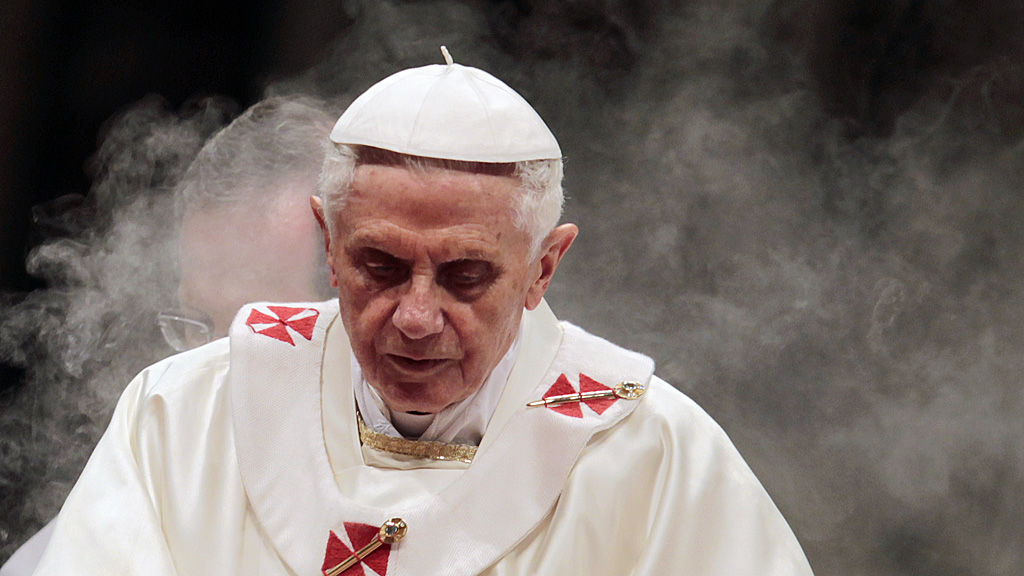Pope Benedict and sex abuse: suffer the children?
The evolution of Pope Benedict XVI’s responses to allegations of child abuse by members of the Catholic clergy reflects a growing public awareness of the issue. But has he gone far enough?

Since 1977, when he became archbishop of Munich, Joseph Ratzinger has had to address allegations of abuse against children by members of the Catholic clergy.
In 1981, while still archbishop of Munich, Ratzinger was named prefect of the Sacred Congregation for the Doctrine of the Faith (CDF) by the then pope, John Paul II. He became the Catholic church’s theological enforcer, earning himself the soubriquet “God’s Rottweiler”. His responsibilities included dealing with cases of child abuse by Catholic priests.
Nearly a quarter-century later, in 2005, Joseph Ratzinger relinquished his position at the CDF when he became Pope. Although his time at the CDF had undoubtedly coincided with growing public awareness of child sex abuse, it emerged not long after his election to the papacy that he had issued an order to Catholic bishops asserting the church’s right to investigate cases of abuse behind closed doors.
Abuse in Ireland
Four years later the ability of the church under Pope Benedict XVI to respond to this public awareness was tested when the Irish government published two highly critical reports.
The first investigated all forms of child abuse in Catholic schools from the 1930s to the 1990s. The second looked at how the Dublin archdiocese had dealt with allegations of child sex abuse between 1975 and 2004. Five Irish bishops stepped down in the wake of the reports.
In March 2010 the Pope sent a message to Catholics in Ireland referring to “these sinful and criminal acts”. He asked “priests and religious who have abused children” to “submit yourselves to the demands of justice”. Significantly, the letter appears to articulate a move away from viewing child abuse by priests in terms of sin and repentance and towards crime and punishment.
On the issue of child abuse he was absolutely vigorous… he took the strongest possible action and guided us into a very different future. Patrick Kelly, archbishop of Liverpool
In July 2011 the Vatican recalled its ambassador to the Irish Republic. It followed publication of the Cloyne report into the handling of abuses allegations against 19 priests between 1996 and 2009, which concluded Irish clerics had concealed from authorities the sexual abuse of children.
The report also claimed the Vatican had treated mandatory child protection guidelines as “study guidelines”. A motion was subsequently passed by the Irish parliament, the Dail, accusing the Holy See of “undermining child protection frameworks”.
The Vatican rejected as “unfounded” accusations of Vatican interference in Irish laws. It also said Irish Prime Minister Enda Kenny had taken out of context a phrase by Pope Benedict when he was a cardinal, in which he asserted that “standards of conduct appropriate to civil society… cannot be purely and simply applied to the church”.
‘Strongest possible action’
Speaking in the wake of Pope Benedict’s resignation, Archbishop of Liverpool Patrick Kelly told Channel 4 News: “On the issue of child abuse he was absolutely vigorous on that, as he had been before he became Pope, and on that he took the strongest possible action and guided us into a very different future.”
The fact is that Pope Benedict, unlike Pope John Paul II, has not ignored the problem of clerical sex abuse. But concerns over the seriousness of the Pope’s approach to child abuse will not have been allayed by the publication of a Vatican document in July 2010 which aims – inadequately, in the view of critics – to codify procedures for trying priests accused of child sexual abuse.
The document prompted outrage by bracketing child sex abuse and the attempted ordination of women as comparable crimes. The Catholic church may have further to refine his response to the problem of abuse if it is to retain its moral and religious influence in the world.